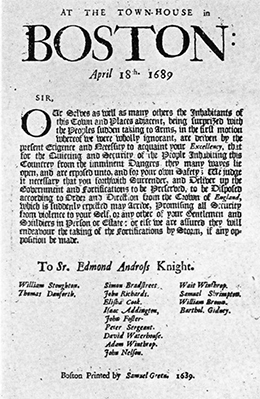| << Chapter < Page | Chapter >> Page > |

The Glorious Revolution provided a shared experience for those who lived through the tumult of 1688 and 1689. Subsequent generations kept the memory of the Glorious Revolution alive as a heroic defense of English liberty against a would-be tyrant.
The Glorious Revolution led to the establishment of an English nation that limited the power of the king and provided protections for English subjects. In October 1689, the same year that William and Mary took the throne, the 1689 Bill of Rights established a constitutional monarchy. It stipulated Parliament’s independence from the monarchy and protected certain of Parliament’s rights, such as the right to freedom of speech, the right to regular elections, and the right to petition the king. The 1689 Bill of Rights also guaranteed certain rights to all English subjects, including trial by jury and habeas corpus (the requirement that authorities bring an imprisoned person before a court to demonstrate the cause of the imprisonment).
John Locke (1632–1704), a doctor and educator who had lived in exile in Holland during the reign of James II and returned to England after the Glorious Revolution, published his Two Treatises of Government in 1690. In it, he argued that government was a form of contract between the leaders and the people, and that representative government existed to protect “life, liberty and property.” Locke rejected the divine right of kings and instead advocated for the central role of Parliament with a limited monarchy. Locke’s political philosophy had an enormous impact on future generations of colonists and established the paramount importance of representation in government.
Visit the Digital Locke Project to read more of John Locke’s writings. This digital collection contains over thirty of his philosophical texts.
The Glorious Revolution also led to the English Toleration Act of 1689, a law passed by Parliament that allowed for greater religious diversity in the Empire. This act granted religious tolerance to nonconformist Trinitarian Protestants (those who believed in the Holy Trinity of God the Father, Son, and Holy Ghost), such as Baptists (those who advocated adult baptism) and Congregationalists (those who followed the Puritans’ lead in creating independent churches). While the Church of England remained the official state religious establishment, the Toleration Act gave much greater religious freedom to nonconformists. However, this tolerance did not extend to Catholics, who were routinely excluded from political power. The 1689 Toleration Act extended to the British colonies, where several colonies—Pennsylvania, Rhode Island, Delaware, and New Jersey—refused to allow the creation of an established colonial church, a major step toward greater religious diversity.
The threat of a Catholic absolute monarchy prompted not only the overthrow of James II but also the adoption of laws and policies that changed English government. The Glorious Revolution restored a Protestant monarchy and at the same time limited its power by means of the 1689 Bill of Rights. Those who lived through the events preserved the memory of the Glorious Revolution and the defense of liberty that it represented. Meanwhile, thinkers such as John Locke provided new models and inspirations for the evolving concept of government.

Notification Switch
Would you like to follow the 'U.s. history' conversation and receive update notifications?